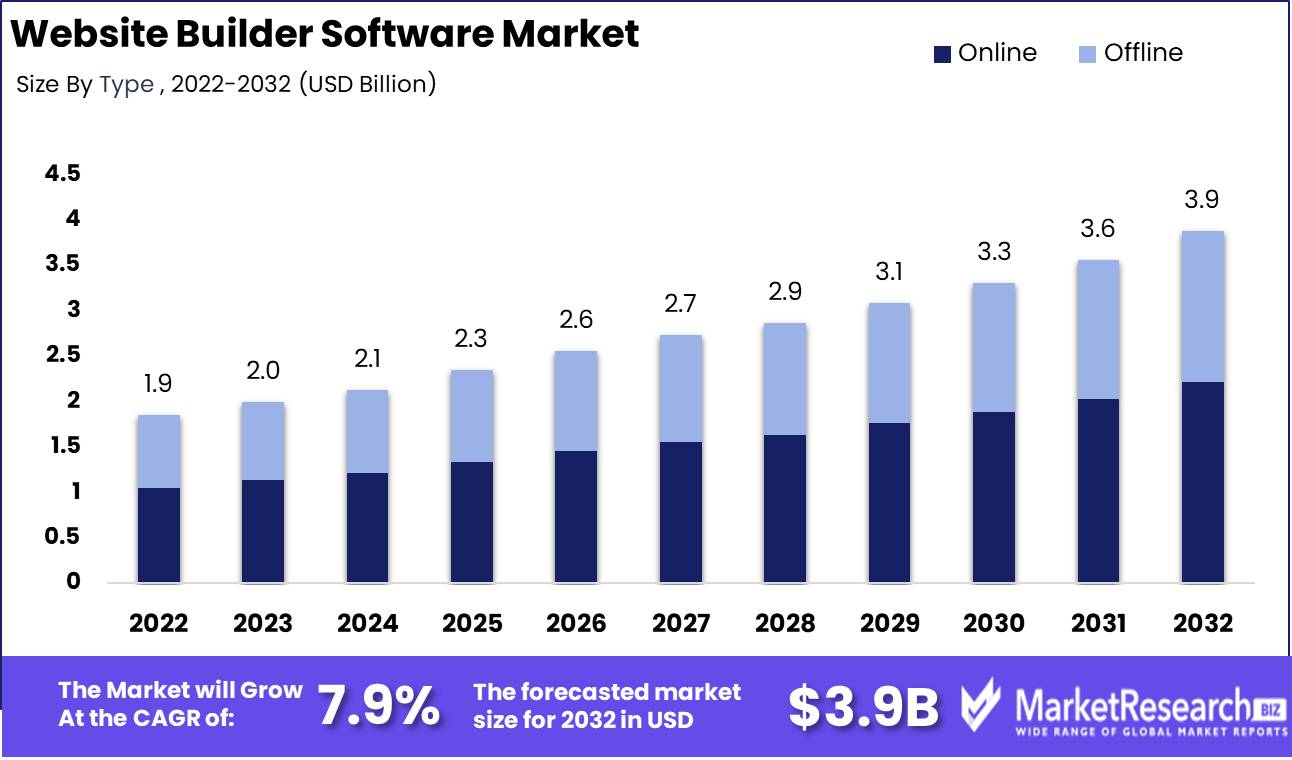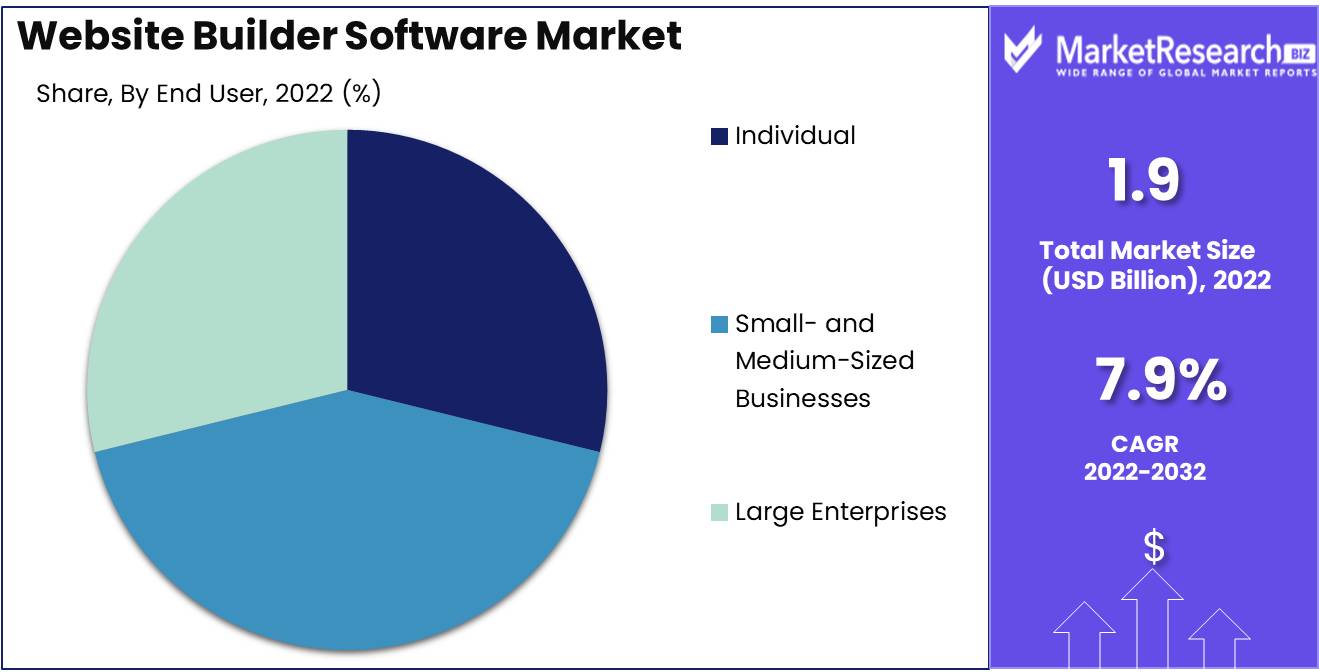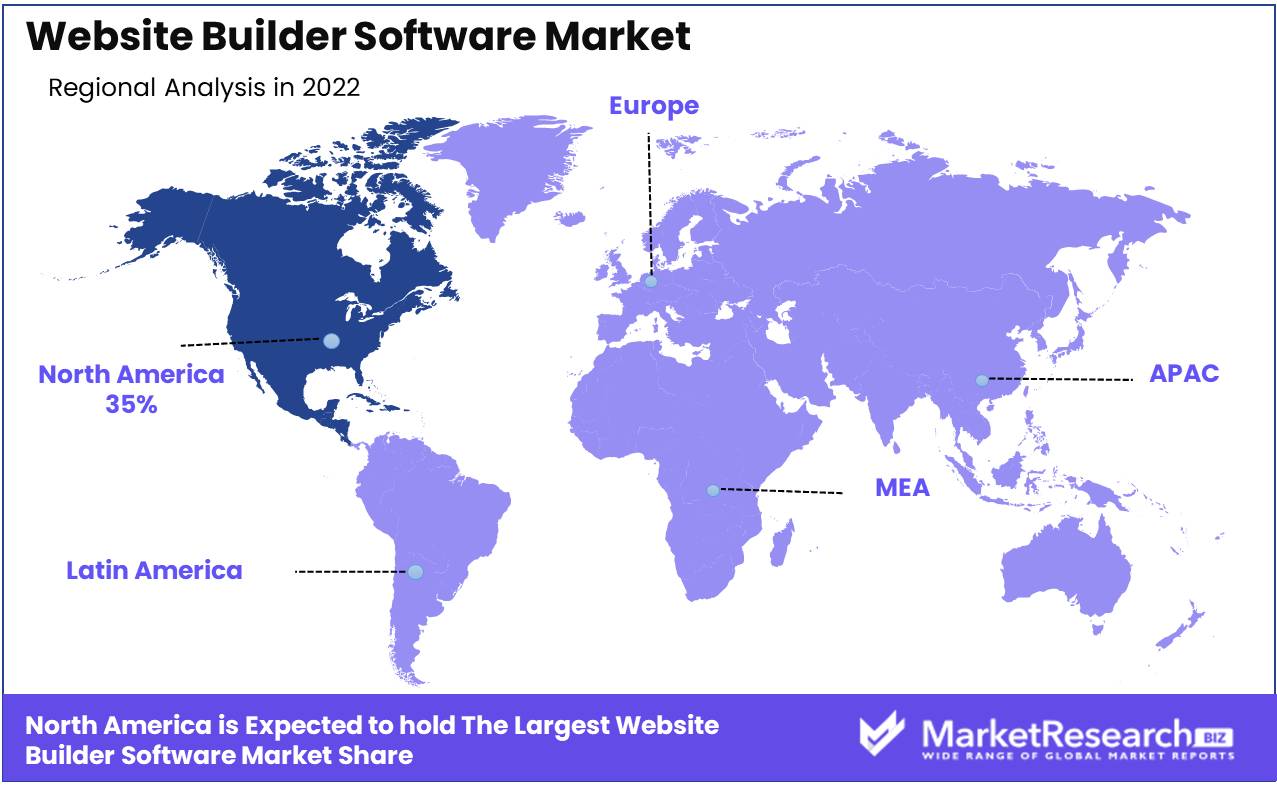
Website Builder Software Market By Type(Online, Offline), By Application(E-Commerce Websites, Brochure Websites, Others), By End User(Individual, Small- and Medium-Sized Businesses), By Region And Companies - Industry Segment Outlook, Market Assessment, Competition Scenario, Trends, And Forecast 2023-2032
-
26949
-
Sept 2023
-
171
-
-
This report was compiled by Correspondence Linkedin | Detailed Market research Methodology Our methodology involves a mix of primary research, including interviews with leading mental health experts, and secondary research from reputable medical journals and databases. View Detailed Methodology Page
-
Report Overview
Website Builder Software Market size is expected to be worth around USD 3.9 Bn by 2032 from USD 1.9 Bn in 2022, growing at a CAGR of 7.9% during the forecast period from 2023 to 2032.
Website builder software is a platform or tool that enables businesses and individuals to create websites without any prior coding knowledge. Website builders typically offer a drag-and-drop interface, making it easy to add and remove elements from a web page. Many website builders also offer a variety of pre-built templates and themes, making it easy to create a professional-looking website quickly and easily.

The market is experiencing dynamic growth due to rapid technological advancements, widespread internet penetration, and increasing importance of online presence for individuals and businesses alike. This sector offers various solutions to create websites without needing advanced coding skills. While the market is expanding, there are also challenges and trends that stakeholders need to consider.
Driving factors
Increasing Internet Penetration
The internet has transformed into an essential utility, touching almost every aspect of daily life. According to statistics, nearly 4.9 billion people globally are now connected to the internet, marking an annual growth rate of about 7.3%.
This significant growth is not just limited to developed nations; developing countries are also witnessing rapid internet penetration, creating a new demographic of consumers and businesses seeking an online presence. This increased internet accessibility contributes to the demand for website builder software as people wish to leverage the online space for both personal and commercial use.
DIY Culture
The Do-It-Yourself (DIY) culture has gained substantial traction in recent years. This trend has extended beyond home improvement and crafts to the digital realm, where people are empowered to create their websites without needing technical expertise in coding.
The website builder software capitalizes on this trend by providing intuitive, easy-to-use interfaces that cater to users with limited technical skills. Individuals, freelancers, and small businesses find this particularly appealing, as it allows them to establish an online presence quickly and cost-effectively.
E-commerce Boom
E-commerce is a sector that has seen remarkable growth, predicted to reach a value of $6.5 trillion by 2025. Many businesses are transitioning from brick-and-mortar setups to online platforms, thereby increasing the demand for website builder software that offers integrated e-commerce solutions. These platforms provide readily available templates for e-commerce, shopping cart functionalities, and payment gateways, simplifying the entire process of setting up an online store.
Restraining Factors
Technical Limitations
Despite their many advantages, website builder platforms come with their set of limitations, particularly in the area of customization. For those needing specialized functionalities or complex features such as custom back-end logic or advanced data manipulations, these platforms often fall short. These limitations can become bottlenecks for businesses looking to scale or customize their web presence to a significant degree.
Data Ownership Concerns
As businesses become increasingly digital, issues surrounding data privacy and security have moved to the forefront of concerns. Utilizing third-party platforms for website creation often raises questions about data ownership. Businesses are wary about where the data is stored, who has access to it, and how securely it is handled. These concerns can deter potential users from adopting website builder software, opting instead for bespoke solutions where they have greater control over their data.
Type Analysis
By Type Analysis Online Segment is dominating the Website Builder Software Market
The market share has been held by online products for almost 90 years; this can be explained by their superior ease of use, accessibility, and cost efficiency over offline models.
Online website builders can be accessed from anywhere with an internet connection, typically offering a wider selection of features and templates than their offline counterparts. Furthermore, their intuitive design makes them simpler for beginners with no prior coding knowledge to navigate their interface.
Offline website builders tend to be more costly and require greater technical skills to use effectively, as they cannot be updated easily.
Application Analysis
From an Application Analysis standpoint, E-Commerce website segments dominate the Market.
E-commerce website builder software market share exceeds 50% due to their widespread adoption as an effective platform for businesses of all kinds to sell products and services online.
Website builders make it simple for businesses to launch and manage e-commerce websites without needing prior coding expertise. Many website builders provide features essential for an e-commerce website like product catalogs, payment processing integration, and shipping integration - features that may otherwise require special knowledge to manage.
End User Analysis
End User Analysis has shown that Small and Medium-Sized Businesses (SMBs) dominate the Website Builder Software Market.
Small- and medium-sized businesses (SMBs) account for more than 60% of the market shares, due to the fact they often need to build and manage a website without sufficient funds available to hire web developers.
Website builders provide small to medium-sized businesses (SMBs) with an easy and cost-effective solution for creating professional-looking websites quickly. Website builders typically feature templates designed specifically to cater to SMBs' needs such as business tools, contact forms and social media integration.

Key Market Segments
Type
- Online
- Offline
Application
- E-Commerce Websites
- Brochure Websites
- Others
End User
- Individual
- Small- and Medium-Sized Businesses
- Large Enterprises
Latest Trends
AI Integration
Artificial Intelligence (AI) has been a game-changer in various industries, and the website builder software market is no exception. AI-powered design suggestions offer users the ability to create aesthetically pleasing and functional websites with minimal effort. Additionally, AI-driven analytics are becoming standard features that help businesses understand user behavior, traffic patterns, and other crucial metrics. This analytical insight is invaluable for optimizing websites for better user engagement and conversion rates. The integration of AI not only simplifies the website-building process but also adds a layer of intelligence that was previously lacking.
Mobile Responsiveness
The importance of mobile-responsive design can't be overstated in today's increasingly mobile-first world. According to Statista, mobile internet usage has overtaken desktop, with over 50% of global internet traffic now coming from mobile devices. Recognizing this shift, website builder platforms are prioritizing mobile-responsive design features. They provide tools that automatically adapt the layout, images, and other elements to fit different screen sizes. As mobile internet usage continues to rise, platforms failing to offer mobile-responsive features risk becoming obsolete.
E-commerce Features
The rise of online shopping has had a monumental impact on the market. With e-commerce sales soaring globally, there is a growing need for platforms that offer integrated e-commerce solutions. Many website builders are now providing features like shopping carts, payment gateways, and even inventory management capabilities right out of the box. These comprehensive solutions make it easier for businesses of all sizes to step into the e-commerce space, leveling the playing field between small retailers and large enterprises.
The shift towards these trends is evident, with 60% of new websites now being created using some form of website builder software, an increase from 45% two years ago.
Regional Analysis
North America continues to dominate the website builder software market, accounting for approximately 35% of the global revenue. The region is home to a large number of tech-savvy consumers and a robust landscape of small and medium-sized enterprises, which contributes to its leading position. There's also a mature digital infrastructure in place, enabling easier access and usage of web-building platforms. Moreover, many of the major players in the website builder market are based in North America, particularly the United States, adding to the region's influence.
Europe is emerging as a significant market, particularly because of its stringent data protection regulations, such as GDPR. These regulations are prompting a rise in local website builder platforms that comply with European laws. Furthermore, the European market is highly diverse, with multiple languages and cultures, requiring platforms to offer localized solutions. This diversity and emphasis on data protection are key drivers for the growth of the market in Europe.
North America and Europe together make up over 60% of the global market for website builder software. However, the high growth rate in the Asia-Pacific region indicates a shift that could diversify the market landscape in the coming years.

Key Regions and Countries
North America
- US
- Canada
- Mexico
Western Europe
- Germany
- France
- The UK
- Spain
- Italy
- Portugal
- Ireland
- Austria
- Switzerland
- Benelux
- Nordic
- Rest of Western Europe
Eastern Europe
- Russia
- Poland
- The Czech Republic
- Greece
- Rest of Eastern Europe
APAC
- China
- Japan
- South Korea
- India
- Australia & New Zealand
- Indonesia
- Malaysia
- Philippines
- Singapore
- Thailand
- Vietnam
- Rest of APAC
Latin America
- Brazil
- Colombia
- Chile
- Argentina
- Costa Rica
- Rest of Latin America
Middle East & Africa
- Algeria
- Egypt
- Israel
- Kuwait
- Nigeria
- Saudi Arabia
- South Africa
- Turkey
- United Arab Emirates
- Rest of MEA
Market Share & Key Players Analysis
Wix is one of the top website builder software providers. Renowned for its user-friendly interface and wide range of templates, Wix can meet the needs of businesses of all sizes with its drag-and-drop functionality, e-commerce features, and SEO tools; making it a favorite among entrepreneurs and small businesses alike.
Squarespace is widely recognized for its elegant website templates that appeal to creative professionals and small businesses looking for a sophisticated online presence. Squarespace features blogging and e-commerce capabilities with excellent customer support services to match.
Weebly is another user-friendly website builder that places emphasis on ease of use, offering various themes, e-commerce functionality, and basic SEO tools. Weebly has become popular among small businesses as well as individual bloggers alike.
Shopify's website builder capabilities make it an excellent solution for businesses that wish to simultaneously sell products online and build a branded site simultaneously. Shopify's flexibility and scalability make it one of the leaders in this market.
Top Key Players in the Website Builder Software Market
- Square Inc. (Weebly)
- Squarespace
- Strikingly
- VOOG
- Website.com Solutions Inc.
- Wix.com
- WOW Slider
- Yola Inc.
- Zoho Corporation Pvt. Ltd.
- Sitebuilder
- SITE123
- Simbla
- SimpleSite
- Shopify
- GoDaddy Operating Company
- HubSpot Inc.
- Freesites
- Google LLC
- Jimdo
- Microsoft Corporation
Recent Development
- In 2021, Wix launched Editor X to give users greater control over the design and layout of their websites.
- In 2022, Squarespace launched its Fluid Engine to enable users to easily create websites with responsive designs that adapt to any screen size.
- In 2023, GoDaddy unveiled its Website Builder platform, complete with a drag-and-drop editor and numerous templates and customization options.
Report Scope:
Report Features Description Market Value (2022) USD 1.9 Bn Forecast Revenue (2032) USD 3.9 Bn CAGR (2023-2032) 7.9% Base Year for Estimation 2022 Historic Period 2016-2022 Forecast Period 2023-2032 Report Coverage Revenue Forecast, Market Dynamics, COVID-19 Impact, Competitive Landscape, Recent Developments Segments Covered Type(Online, Offline), Application(E-Commerce Websites, Brochure Websites, Others), End User(Individual, Small- and Medium-Sized Businesses, Large Enterprises) Regional Analysis North America – The US, Canada, & Mexico; Western Europe – Germany, France, The UK, Spain, Italy, Portugal, Ireland, Austria, Switzerland, Benelux, Nordic, & Rest of Western Europe; Eastern Europe – Russia, Poland, The Czech Republic, Greece, & Rest of Eastern Europe; APAC – China, Japan, South Korea, India, Australia & New Zealand, Indonesia, Malaysia, Philippines, Singapore, Thailand, Vietnam, & Rest of APAC; Latin America – Brazil, Colombia, Chile, Argentina, Costa Rica, & Rest of Latin America; Middle East & Africa – Algeria, Egypt, Israel, Kuwait, Nigeria, Saudi Arabia, South Africa, Turkey, United Arab Emirates, & Rest of MEA Competitive Landscape Square Inc. (Weebly), Squarespace, Strikingly, VOOG, Website.com Solutions Inc., Wix.com, WOW Slider, Yola Inc., Zoho Corporation Pvt. Ltd., Sitebuilder, SITE123, Simbla, SimpleSite, Shopify, GoDaddy Operating Company, HubSpot Inc., Freesites, Google LLC, Jimdo, Microsoft Corporation Customization Scope Customization for segments, region/country-level will be provided. Moreover, additional customization can be done based on the requirements. Purchase Options We have three licenses to opt for: Single User License, Multi-User License (Up to 5 Users), Corporate Use License (Unlimited User and Printable PDF) -
-
- Square Inc. (Weebly)
- Squarespace
- Strikingly
- VOOG
- Website.com Solutions Inc.
- Wix.com
- WOW Slider
- Yola Inc.
- Zoho Corporation Pvt. Ltd.
- Sitebuilder
- SITE123
- Simbla
- SimpleSite
- Shopify
- GoDaddy Operating Company
- HubSpot Inc.
- Freesites
- Google LLC
- Jimdo
- Microsoft Corporation




